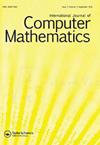带坡度选择的分子束外延模型的能量稳定和收敛BDF3-5格式
IF 1.3
4区 数学
Q2 MATHEMATICS, APPLIED
International Journal of Computer Mathematics
Pub Date : 2023-04-26
DOI:10.1080/00207160.2023.2208236
引用次数: 0
摘要
利用3-5阶后向微分公式(BDF3-5)模拟了具有坡度选择的分子束外延(MBE)模型。在估计的时间步长要求下,完全隐式的BDF3-5方案是唯一可解的。我们利用BDF3-5公式的离散梯度结构证明了这些格式保留了修正后的离散能量耗散规律。此外,我们提出了一个新的卷积不等式来处理误差估计的非线性项。更重要的是,在没有Lipschitz有界假设的情况下,严格证明了BDF3-5格式的范数收敛性分析。数值算例验证了所提方案的有效性和准确性。本文章由计算机程序翻译,如有差异,请以英文原文为准。
Energy stable and convergent BDF3-5 schemes for the molecular beam epitaxial model with slope selection
The backward differential formulas of order 3-5 (BDF3-5) are applied to simulate the molecular beam epitaxial (MBE) model with slop selection. The fully implicit BDF3-5 schemes are uniquely solvable under an estimated time-step requirement. We prove that the schemes conserve the modified discrete energy dissipation laws by utilizing the discrete gradient structures of BDF3-5 formulas. Furthermore, we present a new convolution inequality to handle the nonlinear term for the error estimate. More importantly, the norm convergence analysis of the BDF3-5 schemes are proved rigorously without the assumption of Lipschitz boundedness. Numerical examples are shown to verify the efficiency and the accuracy of the developed schemes.
求助全文
通过发布文献求助,成功后即可免费获取论文全文。
去求助
来源期刊
CiteScore
3.60
自引率
0.00%
发文量
72
审稿时长
5 months
期刊介绍:
International Journal of Computer Mathematics (IJCM) is a world-leading journal serving the community of researchers in numerical analysis and scientific computing from academia to industry. IJCM publishes original research papers of high scientific value in fields of computational mathematics with profound applications to science and engineering.
IJCM welcomes papers on the analysis and applications of innovative computational strategies as well as those with rigorous explorations of cutting-edge techniques and concerns in computational mathematics. Topics IJCM considers include:
• Numerical solutions of systems of partial differential equations
• Numerical solution of systems or of multi-dimensional partial differential equations
• Theory and computations of nonlocal modelling and fractional partial differential equations
• Novel multi-scale modelling and computational strategies
• Parallel computations
• Numerical optimization and controls
• Imaging algorithms and vision configurations
• Computational stochastic processes and inverse problems
• Stochastic partial differential equations, Monte Carlo simulations and uncertainty quantification
• Computational finance and applications
• Highly vibrant and robust algorithms, and applications in modern industries, including but not limited to multi-physics, economics and biomedicine.
Papers discussing only variations or combinations of existing methods without significant new computational properties or analysis are not of interest to IJCM.
Please note that research in the development of computer systems and theory of computing are not suitable for submission to IJCM. Please instead consider International Journal of Computer Mathematics: Computer Systems Theory (IJCM: CST) for your manuscript. Please note that any papers submitted relating to these fields will be transferred to IJCM:CST. Please ensure you submit your paper to the correct journal to save time reviewing and processing your work.
Papers developed from Conference Proceedings
Please note that papers developed from conference proceedings or previously published work must contain at least 40% new material and significantly extend or improve upon earlier research in order to be considered for IJCM.

 求助内容:
求助内容: 应助结果提醒方式:
应助结果提醒方式:


